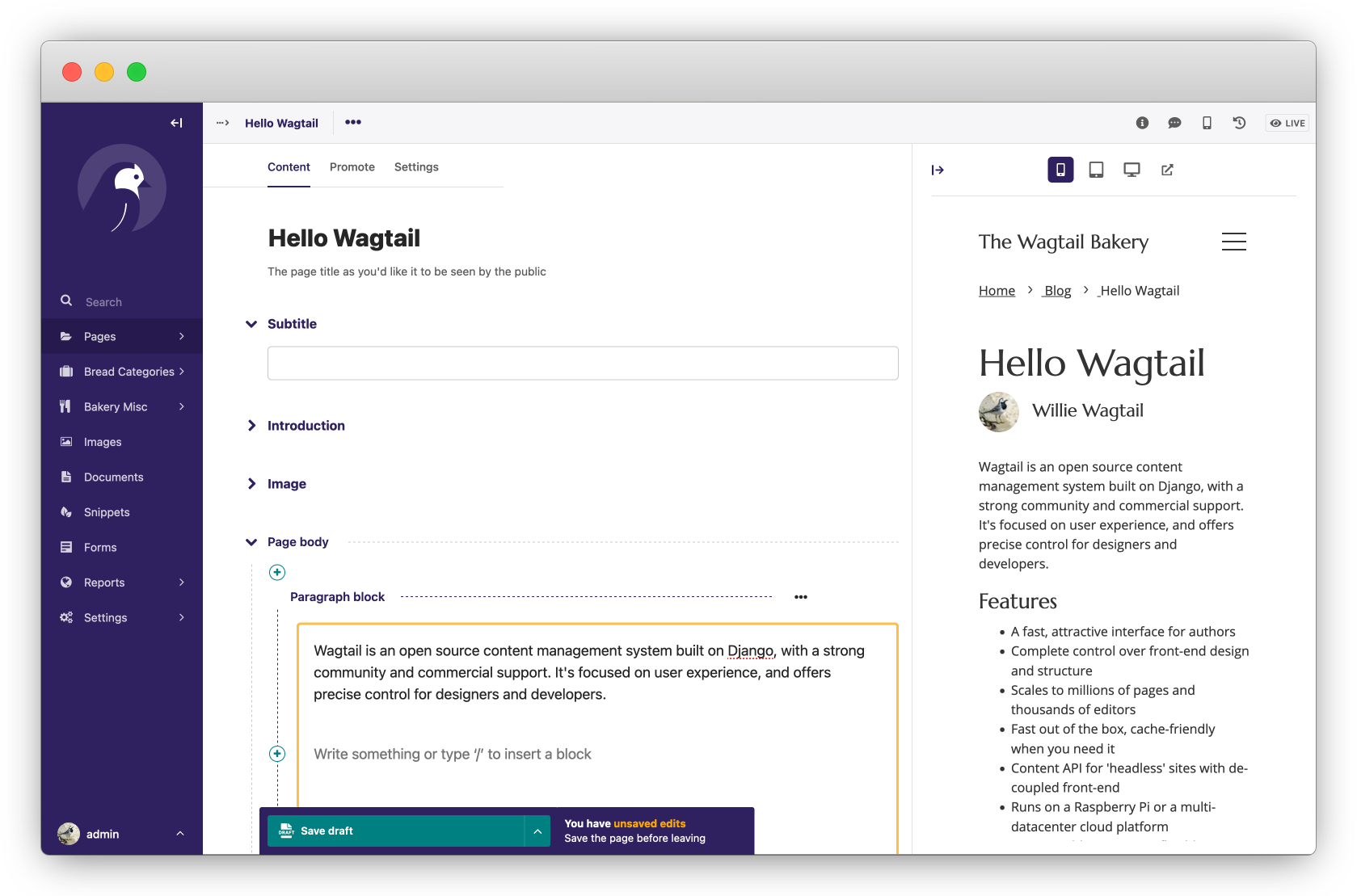Wagtail is an open source content management system built on Django, with a strong community and commercial support. It's focused on user experience, and offers precise control for designers and developers.
Wagtail Space is coming in June 2024! Don't miss your chance to meet other Wagtailers in person. The Call for Participation and registration for both Wagtail Space 2024 events is open. We'd love to have you give a talk, contribute to a sprint, or join us as an attendee in June.
- Wagtail Space NL, Arnhem, The Netherlands. 2024-06-12 - 2024-06-14
- Wagtail Space US, Philadelphia, PA. 2024-06-20 to 2024-06-22
- A fast, attractive interface for authors
- Complete control over front-end design and structure
- Scales to millions of pages and thousands of editors
- Fast out of the box, cache-friendly when you need it
- Content API for 'headless' sites with decoupled front-end
- Runs on a Raspberry Pi or a multi-datacenter cloud platform
- StreamField encourages flexible content without compromising structure
- Powerful, integrated search, using Elasticsearch or PostgreSQL
- Excellent support for images and embedded content
- Multi-site and multi-language ready
- Embraces and extends Django
Find out more at wagtail.org.
Wagtail works with Python 3, on any platform.
To get started with using Wagtail, run the following in a virtual environment:
pip install wagtail
wagtail start mysite
cd mysite
pip install -r requirements.txt
python manage.py migrate
python manage.py createsuperuser
python manage.py runserverFor detailed installation and setup docs, see the getting started tutorial.
Wagtail is used by NASA, Google, Oxfam, the NHS, Mozilla, MIT, the Red Cross, Salesforce, NBC, BMW, and the US and UK governments. Add your own Wagtail site to madewithwagtail.org.
docs.wagtail.org is the full reference for Wagtail, and includes guides for developers, designers and editors, alongside release notes and our roadmap.
For those who are new to Wagtail, the Zen of Wagtail will help you understand what Wagtail is, and what Wagtail is not.
For developers who are ready to jump in to their first Wagtail website the Getting Started Tutorial will guide you through creating and editing your first page.
Do you have an existing Django project? The Wagtail Integration documentation is the best place to start.
(If you are reading this on GitHub, the details here may not be indicative of the current released version - please see Compatible Django / Python versions in the Wagtail documentation.)
Wagtail supports:
- Django 4.2.x and 5.0.x
- Python 3.8, 3.9, 3.10, 3.11 and 3.12
- PostgreSQL, MySQL and SQLite (with JSON1) as database backends
Previous versions of Wagtail additionally supported Python 2.7, 3.7 and earlier Django versions.
There is an active community of Wagtail users and developers responding to questions on Stack Overflow. When posting questions, please read Stack Overflow's advice on how to ask questions and remember to tag your question "wagtail".
For topics and discussions that do not fit Stack Overflow's question and answer format we have a Slack workspace. Please respect the time and effort of volunteers by not asking the same question in multiple places.
Our GitHub discussion boards are open for sharing ideas and plans for the Wagtail project.
We maintain a curated list of third party packages, articles and other resources at Awesome Wagtail.
Wagtail is sponsored by Torchbox. If you need help implementing or hosting Wagtail, please contact us: [email protected]. See also madewithwagtail.org/developers/ for expert Wagtail developers around the world.
We take the security of Wagtail, and related packages we maintain, seriously. If you have found a security issue with any of our projects please email us at [email protected] so we can work together to find and patch the issue. We appreciate responsible disclosure with any security related issues, so please contact us first before creating a GitHub issue.
If you want to send an encrypted email (optional), the public key ID for [email protected] is 0xbed227b4daf93ff9, and this public key is available from most commonly-used keyservers.
Feature releases of Wagtail are released every three months. Selected releases are designated as Long Term Support (LTS) releases, and will receive maintenance updates for an extended period to address any security and data-loss related issues. For dates of past and upcoming releases and support periods, see Release Schedule.
To try out the latest features before a release, we also create builds from main every night. You can find instructions on how to install the latest nightly release at https://releases.wagtail.org/nightly/index.html
If you're a Python or Django developer, fork the repo and get stuck in! We have several developer focused channels on the Slack workspace.
You might like to start by reviewing the contributing guidelines and checking issues with the good first issue label.
We also welcome translations for Wagtail's interface. Translation work should be submitted through Transifex.
BSD - Free to use and modify for any purpose, including both open and closed-source code.
We thank the following organisations for their services used in Wagtail's development:
BrowserStack provides the project with free access to their live web-based browser testing tool, and automated Selenium cloud testing.
Squash provides the project with free test environments for reviewing pull requests.
Assistiv Labs provides the project with unlimited access to their remote testing with assistive technologies.










